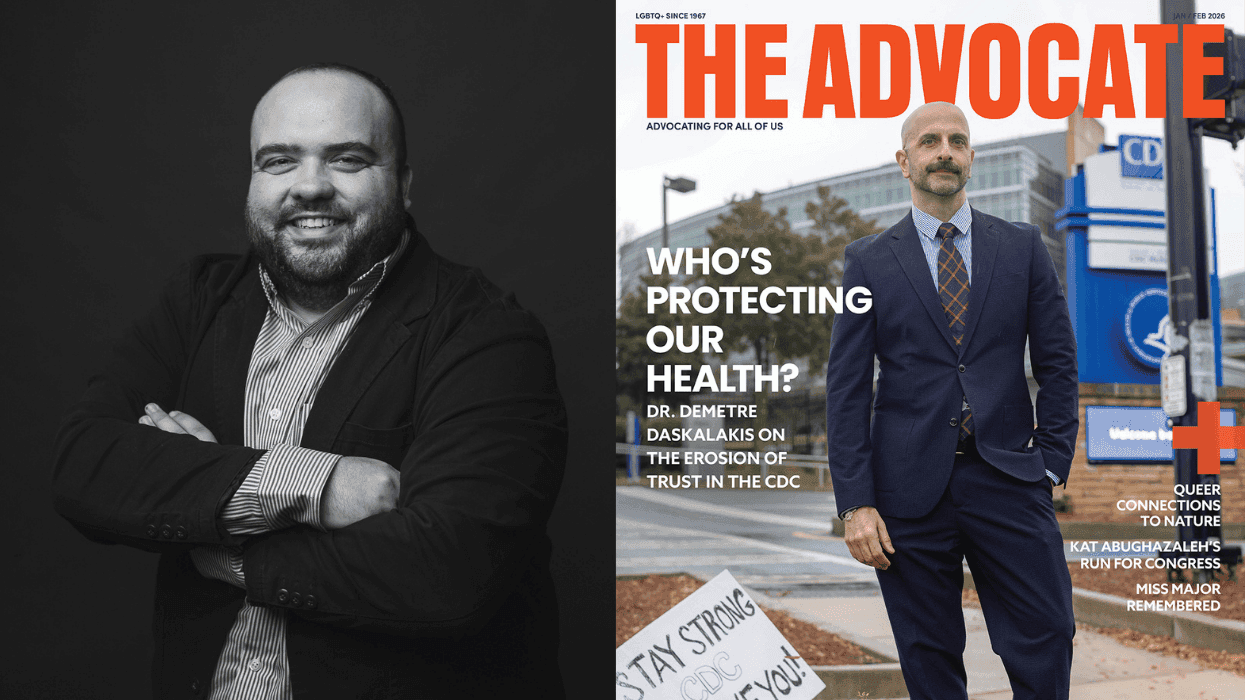Opera queens are gay men who love opera and worship divas, dead or alive. They memorize historic performances, know all the high notes, mimic the mad scenes, and relish in backstage gossip.
But divas who are simultaneously gay icons -- the way Barbra Streisand and Judy Garland are in the pop world -- are far and few between. Maria Callas is prime example, an artist whose Will to Divadom trumped any shortcomings in her voice, and whose life turned as tragic as that of any of the heroines she played. She sacrificed herself for her art, like Tosca, and her turbulent passion cut through your ears directly to your heart, inevitably seared in the process.
Gay men idolized and identified with Callas in a time when the almighty closet ruled. Terrence McNally penned a famous play in her honor, Master Class, and Franco Zeffirelli, who directed her in opera, also made a movie about her called Callas Forever. There are countless examples from other gay artists of lesser status.
Nowadays gay men flock to another American soprano, Deborah Voigt. The 47-year-old, one of the world's leading dramatic sopranos, has somehow become a gay icon, a notion that she's aware of but didn't cultivate herself. She far outruns figures like Marilyn Horne and Jessye Norman who've come close to the lavender lair, but no banana.
"How did that happen?" Voigt asked me after I gave her the good news. Mystified but delighted, she hasn't actively courted gay audiences, or their legendary disposable incomes, as aggressively as the magnificent comedian Kathy Griffin.
"If I knew how to become a gay icon, I would have pursued it from the get-go," she continued. "I'm honored. Gays are such a discerning group." She told me this right after a stunning performance as Isolde in Wagner's Tristan und Isolde at the Metropolitan Opera, her first there. It has a near sold-out run until March 28.
At the first intermission, gay music critics -- a notoriously overrepresented category, rivaling hairdressers and interior designers -- were already gushing over her performance. One said to me, "I think Debbie has gone from being a great singer to a great artist.'' Another chimed in, "Is it me, or is she sounding more resplendent than ever?" You can expect the audiences for this run to have a much higher queer quotient than other Met performances.
Why is that?
First of all, aside from Voigt's excellence appealing to gay good taste, her personal narrative speaks to queers: The Fat Girl Makes Good. Ridiculed all her life for being overweight, Voigt quietly struggled with her self-image as she forged ahead. Like her waistline and hips, her terrific voice couldn't be hidden, as far back as the high school musicals she performed in. Her stabs at opera were not taken seriously at the start -- and she was actively discouraged in some quarters -- but she started entering opera competitions and winning.
Her breakthrough role was Ariadne auf Naxos in Chicago in 1991, when TheNew York Times gave her a rave. She was now on the map, and has since tackled the most demanding roles created by Strauss and Wagner. She has also mastered her share of Italian roles. There was no stopping her.
Ironically, Debbie's size continued to be a problem in the very world where "it ain't over until the fat lady sings." In 2004 she was fired from the very role that made her name. Since she couldn't fit into a slinky little cocktail dress in a trendy production of Ariadne at London's Royal Opera Opera, she was dismissed. Apparently, looks had become more important than vocal excellence -- shallow but not an irrelevant trend in the opera world since the '80s, when slimmer figures with pipes were making headlines.
The outrageous decision, though, forced Voigt to reexamine old issues. With the money she still received from the breached Convent Garden contract, she decided to get gastric bypass surgery. It wasn't a direct response to what had happened -- she had already been wrangling with this notion for a long time, as diets seemed only to add weight. This was a last resort.
When I saw Voigt debut her new body in her first Salome in Chicago, it was another breakthrough. She had avoided that role for a long time because, as she joked, she'd have to do the Dance of the 77 Veils instead of the Dance of the Seven Veils. After shedding about 135 pounds, she was a lithe figure, traipsing about the stage with John the Baptist's head in Strauss's kinkiest opera. The slimming-down had no deleterious effect on her voice.
This story resonates deeply with gay men. But Voigt doesn't appeal only to the opera crowd. She also has a campy, Broadway side, with a measure of sass and sarcasm. She has done benefit concerts for Broadway Cares/Equity Fights AIDS during which a bunch of barely clad muscle men hoisted her presurgery body on heir shoulders. Before embarking on Isolde -- a must-see, must-hear performance for anyone who takes opera seriously -- she opened Lincoln Center's American Songbook Series at the end of January. She can deliver "A Spoonful of Sugar" and "Losing My Mind" like the best of them, from Julie Andrews to Barbara Cook.
Voigt is literally a phenomenon, a great artist not cut in the tragic mold of Callas. She is a triumphant icon for a new era. When I asked her why, only two days after her Isolde debut, she was not resting but performing Strauss's "Four Last Songs" at Carnegie Hall, she said, "If I can run with it now, then I should run." She shows no signs of burning out.
Tristan und Isolde runs through March 28 at the Metropolitan Opera in New York City. The performance on Saturday, March 22 at 12:30 p.m. will be transmitted live to movie theaters around the world as part the of The Met: Live in HD series.















